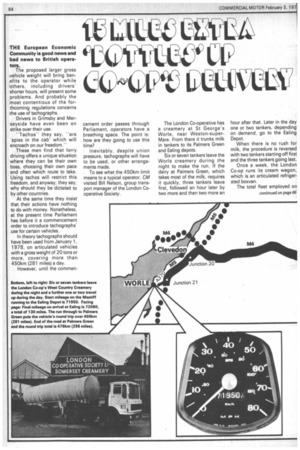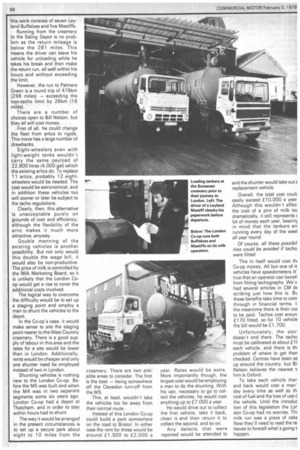THE European Economic Community is good news and bad news to British operators.
Page 66

Page 68

If you've noticed an error in this article please click here to report it so we can fix it.
The proposed larger gross vehicle weight will bring benefits to the operator while others, including drivers' shorter hours, will present some problems. And probably the most contentious of the forthcoming regulations concerns the use of tachographs.
Drivers in Grimsby and Merseyside have even been on strike over their use.
"Tachos" they say, "are 'spies in the cab' which will encroach on our freedom."
These men find that lorry driving offers a unique situation where they can be their own boss, choosing their own pace and often which route to take. Using tachos will restrict this freedom, and anyway, they say, why should they be dictated to by other countries.
At the same time they insist that their actions have nothing to do with money. Nonetheless, at the present time Parliament has before it a commencement order to introduce tachographs' use for certain vehicles.
In theory tachographs should have been used from January 1, 1978, on articulated vehicles with a gross weight of 20 tons or more, covering more than. 450km (281 miles) a day.
However, until the commen cement order passes through Parliament, .operators have a breathing space. The point is: how are they going to use this time?
Inevitably, despite union pressure, tachographs will have to be used, or other arrangements made.
To see what the 450km limit means to a typical operator, CM visited Bill Nelson, group transport manager of the London Cooperative Society.
The London Co-operative has a creamery at St George's Worle, near Weston-superMare. From there it trunks milk in tankers to its Palmers Green and Ealing depots.
Six or seven tankers leave the Worle creamery during the night to make the run. If the dairy at Paimers Green, which takes most of the milk, requires it quickly, three tankers leave first, followed an hour later by two more and then two more an hour after that. Later in the day one or two tankers, depending on demand, go to the Ealing Depot When there is no rush for milk, the procedure is reversed with two tankers starting off first and the three tankers going last.
Once a week, the London Co-op runs its cream wagon, which is an articulated refrigerated boxvan.
The total fleet employed on continued on page 66 this work consists of seven Leyland Buffaloes and five Mastiffs.
Running from the creamery to the Ealing Depot is no problem as the return mileage is below the 281 miles. This means the driver can leave his vehicle for unloading while he takes his break and then make the return run, all well within his hours and without exceeding the limit.
However, the run to Palmers Green is a round trip of 476km (296 miles) — exceeding the non-tacho limit by 26km (16 miles).
There are a number of choices open to Bill Nelson, but they all will cost money . .
First of all, he could change the fleet from artics to rigids. This move has a large number of drawbacks.
Eight-wheelers even with light-weight tanks wouldn't carry the same payload of 22,800 litres (4,000 gal) which the existing artics do. To replace 11 artics, probably 12 eightwheelers would be needed. The cost would be astronomical, and in addition these vehicles too will sooner or later be subject to the tacho regulations.
Clearly, then, this alternative is unacceptable purely on grounds of cost and efficiency, although the flexibility of the artic makes it much more attractive, anyway.
Double manning of the existing vehicles is another possibility. But not only would this double the wage bill, it would also be non-productive. The price of milk is controlled by the Milk Marketing Board, so it is unlikely that the London Coop would get a rise to cover the additional costs involved.
The logical way to overcome the difficulty would be to set up a staging point and employ a man to shunt the vehicles to the depot.
In the Co-op's case, it would make sense to site the staging point nearer to the West Country creamery, There is a good supply of labour in this area and the rates for a site would be lower than in London. Additionally, rents would be cheaper and only one shunter need be employed instead of two in London.
Shunting vehicles is nothing new to the London Co-op. Before the M5 was built and when the M4 was in two separate segments some six years ago, London Co-op had a depot at Thatcham, and in order to stay within hours had to shunt.
The way it would be arranged in the present circumstances is to set up a secure park about eight to 10 miles from the creamery. There are two possible areas to consider. The first is the best — being somewhere off the Clevedon turn-off from the M5.
This, at least, wouldn't take the vehicles too far away from their normal route.
Instead of this London Co-op could build a park somewhere on the road to Bristol. In either case the rent for these would be around £1,500 to £2,000 a year. Rates would be extra. More importantly though, the largest cost would be employing a man to do the shunting. With his van, necessary to go to collect the vehicles, he would cost anything up to £7,000 a year.
He would drive out to collect the first vehicle, take it back, clean itand then return it to collect the second, and so on.
Any defects that were reported would be attended to and the shunter would take out e replacement vehicle.
Overall, the total cost coulc easily exceed El 0,000 a year Although this wouldn't affec. the cost of a pint of milk to dramatically, it still represents E lot of money each year, bearinc in mind that the tankers art running every day of the weel all year round.
Of course, all these possibil ities could be avoided if tacho. were fitted.
This in itself would cost thi Co-op money. All but one of it vehicles have speedometers. It' true that an operator can benef, from fitting tachographs. We'v had several articles in CM de scribing just how this is, Bu these benefits take time to corn through in financial terms. Ii the meantime there is their coE to be paid. Tachos cost aroun, £1 70 fitted, so for 10 vehicle the bill would be £1,700.
Unfortunately, the stor, doesn't end there. The tacho must be calibrated at about £1( each vehicle, and there is thi problem of where to get then checked. Centres have been se up around the country, but Bil Nelson believes the nearest ti him is Oxford.
To take each vehicle ther. and back would cost a man' day every time as well as th. cost of fuel and the loss of use c the vehicle. Until the introduc tion of this legislation the Lor don Co-op had no worries. Thi milk run was a piece of cake Now they'll need to read the te leaves to foretell what's going t. happen.
























































































































































